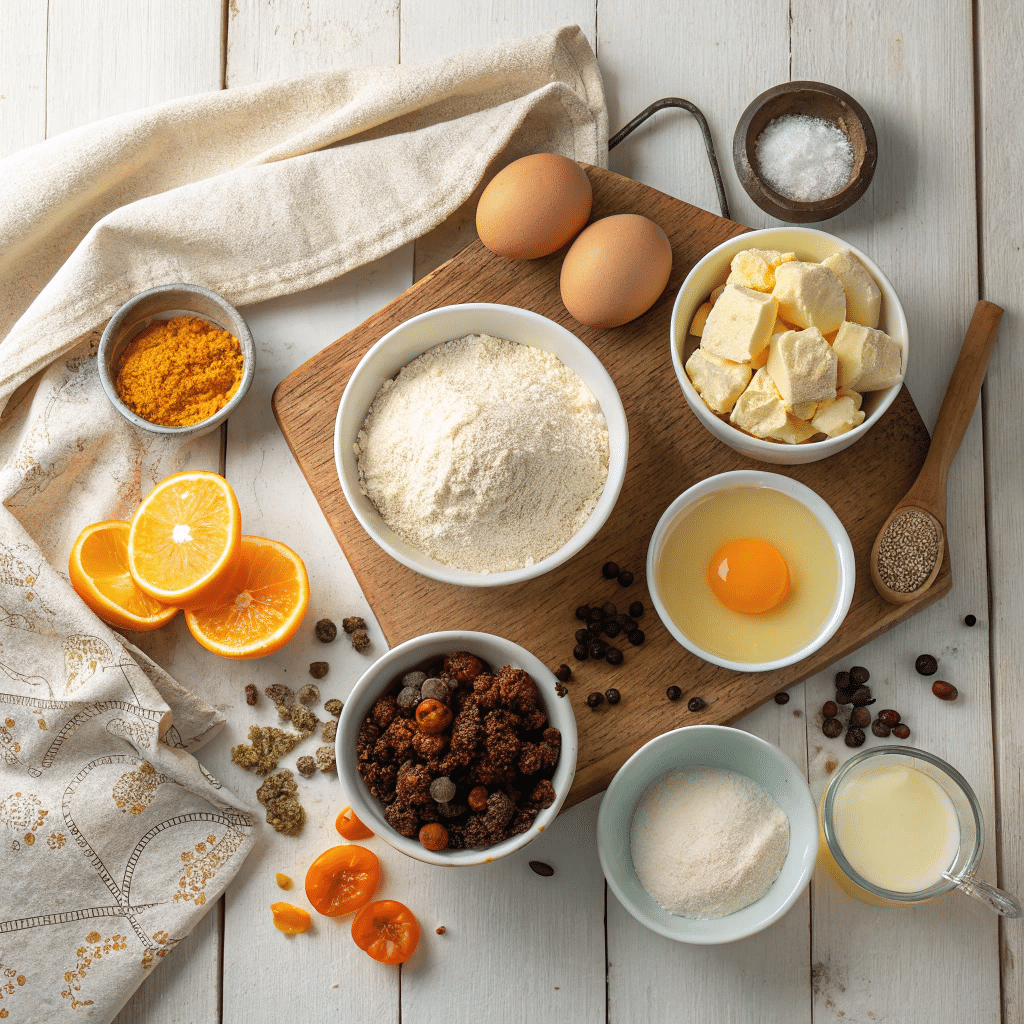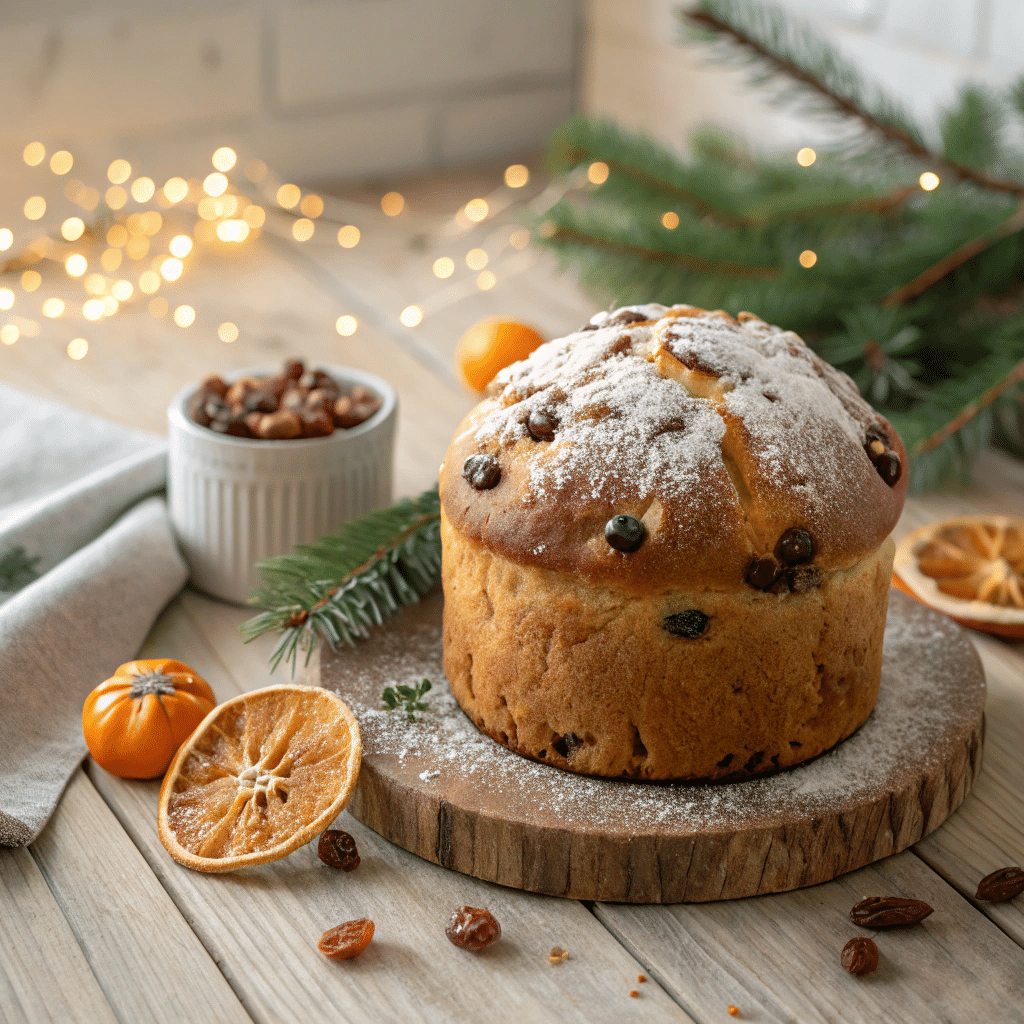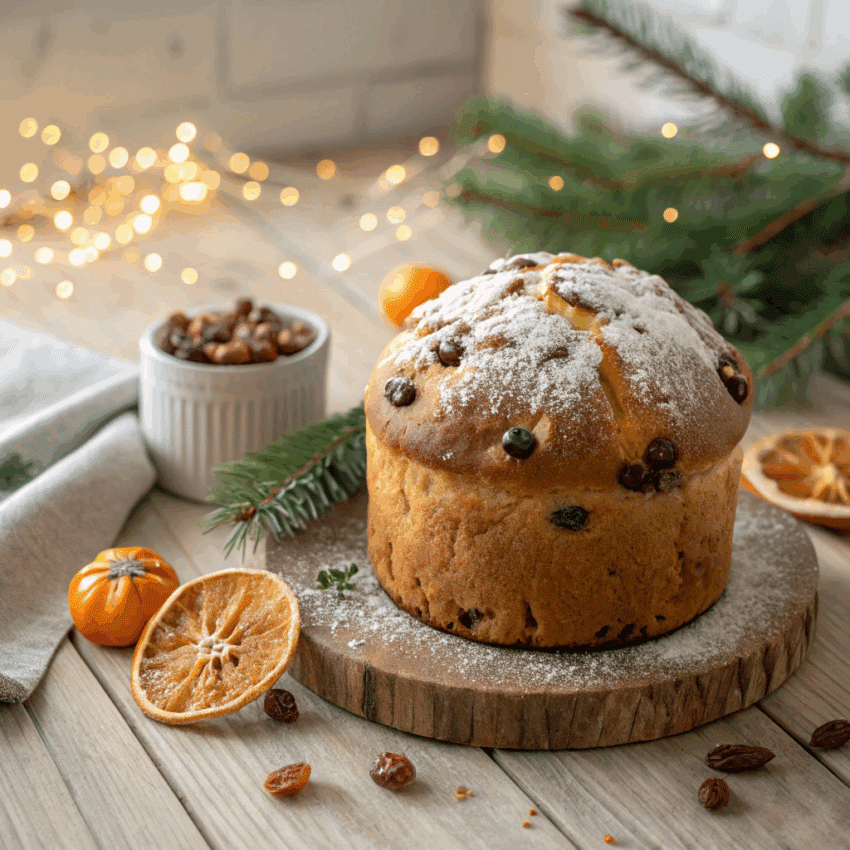Every December, my kitchen turns into a warm, butter-scented haven. The kind of place where sugar dust floats through the air, and every bite feels like a hug from the holidays themselves.
Panettone — or “Panettone Italiano” if you’re feeling fancy — isn’t just any bread. It’s a rich, fluffy, fruit-studded masterpiece that’s been gracing Italian tables for centuries. Some say it originated in Milan; others claim it was born out of a baker’s love story. Either way, this golden loaf has become the heartbeat of Christmas mornings across Italy (and honestly, in my home too).
What Is Panettone Italian Christmas Bread?
If you’ve never met Panettone before, imagine a tall, dome-shaped bread that’s incredibly soft, buttery, and slightly sweet. It’s dotted with dried fruit, citrus peel, and sometimes chocolate or nuts. The crumb is airy and elastic, almost like a cross between brioche and cake.
Traditionally, it’s baked in a paper mold that helps it rise sky-high. The result? A showstopper of a Christmas bread that looks as impressive as it tastes.
Why Panettone Is So Special
Baking Panettone isn’t just about the bread. It’s about slowing down, embracing tradition, and letting your kitchen smell like joy for hours. The dough takes time to develop flavor and structure — no shortcuts here. But don’t let that scare you off. There’s a rhythm to the process that feels oddly relaxing once you get into it.
Plus, slicing into that golden dome and seeing all those specks of fruit? Absolutely worth the wait.
Ingredients You’ll Need

Here’s what you’ll gather before diving in. The ingredients are simple, but together, they create something extraordinary.
For the dough:
- 4 cups all-purpose flour
- ½ cup sugar
- 1 packet (2¼ tsp) active dry yeast
- ½ cup warm milk
- 4 large eggs (room temperature)
- 10 tbsp unsalted butter (softened)
- 1 tsp salt
- 1 tsp pure vanilla extract
- Zest of 1 orange and 1 lemon
For the filling:
- ½ cup raisins
- ½ cup candied orange peel
- ¼ cup chopped dried apricots (optional)
- 2 tbsp rum or warm water (to soak the fruit)
For finishing:
- 1 tbsp melted butter (for brushing)
- Powdered sugar (for dusting)
Step-by-Step Panettone Recipe
Step 1: Wake up the yeast
In a small bowl, mix warm milk with yeast and a teaspoon of sugar. Let it sit for about 10 minutes, until it looks foamy. That’s your yeast telling you it’s alive and ready to work magic.
Step 2: Make the dough
In a large mixing bowl, combine flour, remaining sugar, salt, citrus zest, and vanilla. Add in your yeast mixture and eggs. Mix until a soft dough starts to form.
Then, slowly add the softened butter — one tablespoon at a time — kneading gently until it’s fully incorporated. The dough will look sticky at first, but keep going. After about 10 minutes of kneading (or 7 if using a mixer), it’ll turn smooth and stretchy.
Step 3: The first rise
Place the dough in a greased bowl, cover it with a kitchen towel, and let it rise in a warm spot for 1½ to 2 hours. It should double in size.
Step 4: Add the fruit
While the dough rises, soak your dried fruits in rum (or water if you prefer alcohol-free). Once the dough has puffed up, drain the fruit and fold it gently into the dough. Don’t overmix — just enough to distribute evenly.
Step 5: Shape and rise again
Form the dough into a ball and place it in a Panettone mold (or a tall parchment-lined cake pan). Cover loosely and let it rise again until doubled — about 1 hour.
Step 6: Bake to perfection
Preheat your oven to 350°F (175°C). Bake for 40–45 minutes, until the top is golden brown and a skewer inserted in the center comes out clean. If it’s browning too quickly, tent with foil halfway through.
Step 7: Cool and serve
Once baked, brush the top with melted butter and let it cool completely before slicing. Dust with powdered sugar right before serving for that snowy holiday look.
Tips for the Best Panettone Bread
- Patience is your secret ingredient. Panettone loves time — don’t rush the rising steps.
- Use room temperature eggs and butter. Cold ingredients slow down the yeast and make the dough tougher to work with.
- Don’t skip the zest. That citrus flavor gives Panettone its signature aroma.
- Hang it upside down (optional but authentic). Traditional bakers invert the bread as it cools to keep its fluffy height. You can poke two skewers through the base and suspend it between two pots — totally optional, but fun to try.
Serving Suggestions
You can enjoy Panettone as is, but here are some ways I love to serve it:
- Toasted with butter — because everything tastes better with a little butter.
- Turn it into French toast. Slice, dip, fry, and top with maple syrup for a breakfast worth waking up for.
- Panettone bread pudding — a second life for slightly stale slices.
Pair it with coffee, hot chocolate, or a sweet dessert wine, and you’ve got yourself a little Italian Christmas at home.
Storage Tips
Wrap leftover Panettone tightly in plastic wrap or keep it in an airtight container. It stays fresh for about 4–5 days at room temperature. You can also freeze it for up to 3 months — just slice before freezing for easy reheating later.
A Little Panettone History
Legend has it, Panettone was born in Milan when a young baker accidentally added fruit and butter to his bread dough to impress a nobleman’s daughter. Whether it’s true or not, I love the idea that something this delicious started with love and a happy accident.
Every bite still feels like a little reminder of that — soft, rich, and sweet, just like the holidays should be.

Panettone Italian Christmas Bread
Ingredients
Method
- Mix warm milk, yeast, and 1 teaspoon of sugar in a small bowl. Let it sit for 10 minutes, until foamy.
- In a large bowl, combine flour, sugar, salt, vanilla, and citrus zest. Add yeast mixture and eggs. Mix until it starts to form a dough.
- Add softened butter one tablespoon at a time, kneading until smooth and elastic. It should be soft but not sticky.
- Place dough in a greased bowl, cover with a kitchen towel, and let it rise in a warm spot for 1½ to 2 hours, until doubled.
- Soak raisins, orange peel, and apricots in rum or warm water for 20 minutes. Drain well.
- Gently fold the fruit into the risen dough until evenly spread.
- Form dough into a ball and place it in a Panettone mold (or tall parchment-lined cake pan).
- Cover and let it rise for another 1 hour, or until doubled again.
- Preheat oven to 350°F (175°C). Bake for 40–45 minutes until golden brown. Tent with foil if it browns too quickly.
- Brush the top with melted butter, let it cool completely, and dust with powdered sugar before slicing.
Notes
- Use good quality butter—it makes a big difference in flavor.
- Don’t rush the rising time; that’s what gives Panettone its soft, light texture.
- You can swap raisins with chocolate chips or cranberries if you like.
- Store leftovers in an airtight container or freeze slices for up to 3 months.
FAQs About Panettone Italian Christmas Bread
1. Can I make Panettone without a special mold?
Yes! You can line a tall round cake pan with parchment paper to mimic the shape.
2. Can I skip the dried fruit?
Absolutely. You can add chocolate chips, nuts, or even cranberries if that’s more your style.
3. How long does it take to make Panettone?
The whole process — from start to finish — takes about 5 to 6 hours (most of it is rising time).
4. What’s the difference between Panettone and Pandoro?
Panettone is studded with fruit; Pandoro is plain, buttery, and dusted with powdered sugar.
5. Can I make it ahead of Christmas?
Yes, and it actually tastes better a day after baking as the flavors settle.
Final Thoughts
Making Panettone Italian Christmas Bread isn’t about perfection — it’s about celebration. It’s about slowing down, baking something with care, and sharing it with the people who make your life sweet.
Every loaf tells a story, and every crumb holds a little holiday spirit. So go ahead — tie on that apron, warm up your oven, and bake a little bit of Italy into your Christmas this year.

